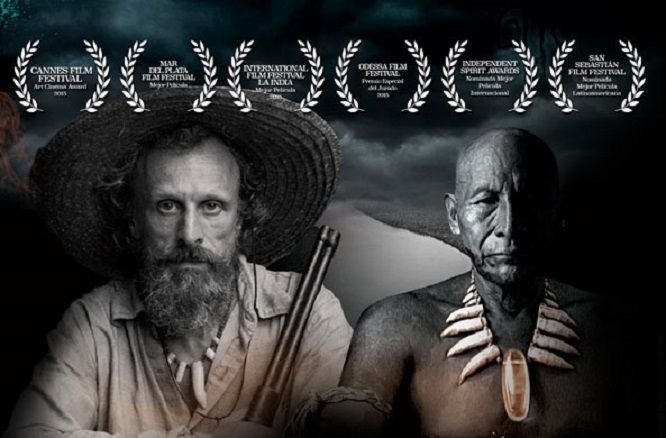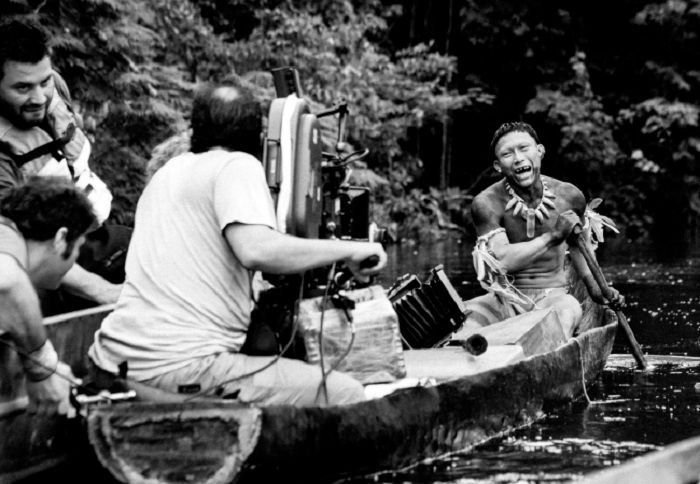Karamakate (Nilbio Torres) is a young shaman, part of a forgotten and perishing tribe, who has reconciled with his loneliness, living in the Amazon River valleys. The German researcher Theo (Jean Bievoiet) and his guide Manduca (Miguel Dionisio Ramos) appear in his life as unexpected guests - the first one is on the border of death, and his friend asks the shaman for help. In the eyes of Karamakate, Theo is a representative of the white men who have exterminated his tribe, and although at first not willing to help, he is then aware that leaving his bitter heart to make such a decision would deprive himself of his humanity.

Years later, in 1940, Karamakate (played by Antonio Bolivar Salvado Yangiama) was visited by another explorer, the American Evans (Brion Davis), seeking the mystical plant yakruna. During the long years of his first encounter with a foreigner, the shaman has replaced his anger with a fatigue that makes his relationship with Evans more heartfelt. The theme of the "worthy savage" might sound overexposed, but Siro Gera's "Embrace of the Serpent" is dedicated to a surrealist study focusing on folkloric native tribes, the study of their spiritual customs and mysticism. In both journeys we witness, the white men embark on life-changing experiences-Theo understands that perhaps he is not the sane person he is considered to be. Typical for the Western man arrogance manifests in his propensity to see natives only in a romantic light. But the same arrogance is also the root cause of colonization attempts. Similar to Conrad's "Heart of Darkness" (as well as Francis Ford Coppola's "Apocalypse Now" masterpiece), "Embrace of the Serpent" explores the idea of civilized man, controversial progress, Christian practices, and hegemony. The first voyage culminates in a meeting with a sadistic Spanish priest, "saving the souls" of orphans, patrolling them with a whip, taking away their tongue, and so locked in the image of the Catholic man, the godfather of the "fierce cannibals." Years later, the mission of the same priest has become a fierce cult, whose leader is considered to be Jesus, encouraging self-deception and ritual suicide.

The two Westerners are based on real people, although the yakurna plant is fictitious. Richard Evans Schultz's work in the Amazon basin goes beyond what has been shown in the film - his research has led to multifaceted discoveries in medicine, as well as a jump in the field of psychiatry. In 1979, he co-authored the book "Plants of the Gods: Their Sacred, Healing and Hallucinogenic Powers" with Dr. Hoffman (LSD's discoverer). The monochrome vision of Embrace of the Serpent is violated only in a magnificent scene where the colors explode and (like Андрей Рублёв's final) uncompromisingly reflect the viewer's mind. The old Karamakate is a rude man who has forgotten the customs of his own ancestors ("They are just paintings on the rocks now," he complains while looking at the petroglyphs), but agrees to help Evans look for the yakurna. When Evans describes himself as a devoted man, Karamakate says that this is the first sensible thing shared by a white man. The two unforgettable trips clarify a fairly beautiful and tragic picture, dotted with curses to "Lord of the Flies " and "Apocalypse Now," but feels like an original cinematic experience that has, in the words of Karamakate, "the worst of two worlds" .
It kind of reminded me to Cannibal Holocaust...at the end is a critique to the Western society, though, that film culminates with a reflection about who the savages really were.
I have to see that film! Thanks for the review.
And please check my own stuff on my blog. I'm pretty new at the Steemit experience.
I salute you from México!
Cannibal Holocaust... interesting analogy :) Okey I will. Cheers! :)
You got a 9.53% upvote from @postpromoter courtesy of @godflesh!
Want to promote your posts too? Check out the Steem Bot Tracker websitevote for @yabapmatt for witness! for more info. If you would like to support the development of @postpromoter and the bot tracker please